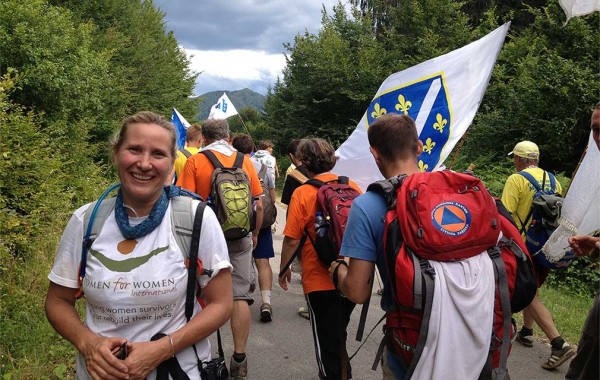
Tracy Greene Craighead ’85
Grave markers dot the 75-mile trail from the town of Nezuk to Srebrenica in Bosnia. These served as constant reminders of the 1995 genocide as Tracy Greene Craighead ’85 trekked the March of Peace in July. She was one of 10,000 people re-tracing the route of refugees who were trying to flee the massacre (in the opposite direction) 20 years earlier.
A volunteer for the nonprofit international development organization Women for Women International (WfWI), Craighead participated in the march as part of its team for the second consecutive year.
She became involved with WfWI approximately seven years ago when a friend asked her to collaborate on a cookbook project for the organization. Although she had no prior publishing experience, Craighead had worked in advertising and marketing, and has a photography background and a love of food. She ended up spearheading the four-year project with five other women, and in 2013, they released Share: The Cookbook That Celebrates Our Common Humanity. It includes a foreword by Meryl Streep as well as contributions by authors ranging from Alice Waters to Dame Judi Dench to Aung San Suu Kyi.
For Craighead, though, the most important person she encountered through the experience was meeting her “sister” in Rwanda in 2012. Through WfWI, Craighead has been sponsoring one “sister” in a different country every year. The program educates and advocates for marginalized women abroad, empowering them to become financially independent — which is critical for them to support their families. So, while doing research for the cookbook — collecting recipes and taking pictures — Craighead met Marie, whom she sponsored in 2010. “She kept all the photographs and letters that I’d written her,” Craighead said. “I just knew how much it meant to her.” The program enabled Marie to establish a clothing business through which she makes and sells children’s clothes.
When traveling to both Rwanda and Kosovo for the cookbook project, “I saw the resilience and the courage of these women who had to rebuild their lives,” Craighead said.
Fast-forwarding to her trips to Bosnia, Craighead again observed the fortitude of people in war-torn countries. Before the start of this year’s event, she met with graduates of the WfWI program. In addition to those who have launched their own businesses, a couple of program participants have recently made local history by becoming the first women elected to their village’s council.
As the march proceeded, Craighead listened to narratives of survival and loss both on the trail and while staying in Bosnian homes at night. “As an individual, the walk is [physically] painful — it’s tiring and you ache,” Craighead said of the hike through unpredictable terrain in 102-degree heat. “But hearing the stories that people share along the way is why I do it. There’s so much hope and inspiration coming from every direction.”
On the final day, the marchers reached the end point, a cemetery and memorial for the genocide victims. The mood was somber as caskets containing recently found remains that were to be reburied there were carried in. Craighead joined up with her teammates to carry their WfWI banner, and as they finished, they were greeted by an outburst of applause. “It was so moving; it was unexpected and heartfelt,” she said.
“My trips to these countries have given me the chance to see how women can create change when they’re given access to resources and education. That’s something I try to share with people when I talk about these experiences, because I know, for me, every little step I can take can make a difference for someone else.”
— Aleta Mayne






